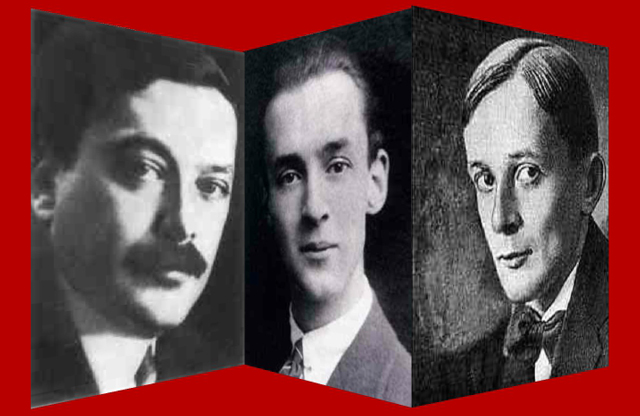November 17, 2014
tiny moments unnoticed by most

I listen to audiobooks all the time.
The current one is a biography of Vladimir Nabokov. This, after listening to Jeremy Irons' reading of Lolita, how wonderful that was, is and always will be.
This is a transcription from rom The Secret History of Vladimir Nabokov by Andrea Pitzer. This scene offers a key to Naboov's sub rosa strategy, I've bolded it for emphasis.
Audible audiobook 1 of 2, 6:53:34
(To set the scene, the Nabokovs have been emigres on the run for what seems their whole life as Russia, then Germany, then Europe crumbles under their feet. Nabokov is about to switch to writing in english as he prepares to move to the USA. Everyone mentioned, I imagine, is yet in the initial arc of their careers. Young, in other words.)
"...Nabokov played an elaborate practical joke on Georgy Adamovich, the critic who so consistently dismissed his verse. Writing poems under the pseudonym of Vasili Shishkov, Nabokov managed to get them published in a leading journal. They were praised by Adamovich, who had no idea that Nabokov had written them, as heralding the arrival of a great poet. A Nabokov short story titled "Vasiliy Shishkov" appeared months later in the same publication. Describing a retiring, gifted poet of the same name, who meets with the narrator twice before vanishing, the pseudonymous poems, combined with the story, which was signed by Nabokov in such a way to make it apparent that the whole thing had been a ruse to appear to prove that Adamovich was unfairly prejudiced against Nabokov's work. With characteristic irreverence, Nabokov was delighted with his trap, which had succeeded perfectly in revealing his critic's bias against him.
But Mark Aldanov chided Nabokov for his gamesmanship, pointing out that while he had been busy playing pranks, a war was underway. Vasili Shiskov seems to represent Nabokov at his most mean spirited and superficial. A tremendous amount of work and literary space were given over just to show someone up and the story's lone trick worked only in combination with the pseudonymous poems. But Aldanov was wrong. Even in apparent trifles, Nabokov was attending to the war. Each time the narrator ostensibly holds meetings with the invented poet in the foreground of the story, a group of German-Jewish refugees appears in the background, discussing the challenges of French identity papers and expressing anxiety over problems with their passports.
Behind the main story, Nabokov had folded in the imminent peril of the refugee Jews. In the story, the imaginary Shiskov describes his literary technique for the narrator: "...a deliberate avoidance of boring approaches to big, burning questions addressed by everyone in favor of attention to tiny moments unnoticed by most, trivia that carries embryos of the most obvious monsters...." The line was almost a literary mission statement of Nabokov, an explanation of what he had been doing in recent years with historical concerns, camps and prisons that haunted his work. But any subtle message the story was overshadowed by its high concept prank. Even before his shaming of Adamovitch, Nabokov had intended to say goodbye to the Russian emigre community with its revolutionary socialist revolutionaries, its scheming monarchists and spy networks.
Posted by Dennis at November 17, 2014 1:10 PM
Leave a comment